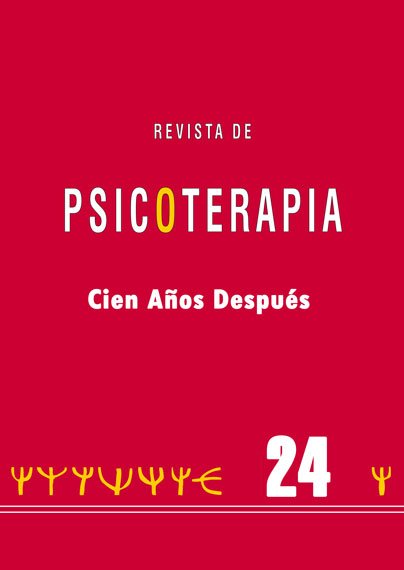One Hundred Years of Psychotherapy: The Future of an Illusion or an Illusory Future?
DOI:
https://doi.org/10.33898/rdp.v6i24.1090Keywords:
psychotherapy, postmodernityAbstract
This paper addresses the challenges that psychotherapy faces in the context of the so called postmodern condition, after one hundred years in the history of psychotherapy. A brief review of the main psychotherapeutic approaches is presented from a cultural and stylistic viewpoint. An attempt to elucidate the definition of the term postmodern is discussed, together with a warning against the potentially ambivalent effects of advocating some forms of postmodern psychotherapy. Finally, from a more afirmative position, a sketch of what could be the main postmodern challenges for psychotherapy is presented.
Downloads
References
ANDERSON, W.T. (1990). Reality isn’t what it used to be. Harper and Row.
BAUMAN, Z., (1993). Postmodernity, or living with ambivalence. In J. Natoli & L. Hutcheon (Eds.), A postmodern reader (pp. 9-24). State University of New York Press.
BERTENS, H. (1993). The postmodern weltanschauung and its relation to modernism: An introductory survey. In J. Natoli & L. Hutcheon (Eds.), A postmodern reader (pp. 25-70). State University of New York Press.
BOTELLA, L. (1995). Personal Construct Psychology, contructivism, and postmodern thought. In R.A. Neimeyer and G.J. Neimeyer (Eds.), Advances in Personal Construct Psychology, III (pp. 3-36). JAI Press.
BOTELLA, L., & FEIXAS, G. (1993). The autobiographical group: A tool for the reconstruction of past life experience with the aged. International Journal of Aging and Human Development, 4, 303-319.
ECO, U. (1984). El nombre de la rosa. Lumen.
EFRAN, J.S., & CLARFIELD, L.E. (1992). Constructionist therapy: Sense and nonsense. In S. McNamee & K.J. Gergen (Eds.), Therapy as social construction (pp. 200-217). Sage.
FEIXAS, G. (1988). L’anàlisi de construccions personals en textos de significació psicològica. Tesis doctoral microfichada (n. 328). Publicacions Universitat de Barcelona.
FEIXAS, G., Y MIRÓ, M.T. (1993). Aproximaciones a la psicoterapia. Paidós.
FEIXAS, G., Y VILLEGAS, M. (1990). Constructivismo y psicoterapia. PPU.
FEYERABEND, P.K. (1976). Against method. Humanities Press.
FOUCAULT, M. (1972). The archaeology of knowledge. Pantheon.
FRANKL, V. Logos, paradoja y búsqueda de significado. En M.J. Mahoney y A. Freeman (Eds.), Cognición y psicoterapia. Paidós.
GERGEN, K.J. (1991). The saturated self. Basic Books.
GERGEN, K.J. (1992). Toward a postmodern psychology. In S. Kvale (Ed.), Psychology and postmodernism (pp.17-30). Sage.
GERGEN, K.J. (1994). Realities and relationships. Harvard University Press.
HELLER, A., Y FEHÉR, F. (1989). Políticas de la postmodernidad. Península.
HOWARD, G.S. (1986). Dare we develop a human science? Notre Dame, In: Academic Publications.
IBÁÑEZ, T. (1992). ¿Cómo se puede no ser constructivista hoy en día? Revista de Psicoterapia, 3(12).
KELLY, G.A., (1977). The psychology of the unknown. In D. Bannister (Ed.), New perspectives in personal construct theory (pp. 1-20). Academic.
KUHN, T.S. (1970). The structure of scientific revolutions. University of Chicago Press. KVALE, S. (Ed.) (1992a). Psychology and postmodernism (pp. 2-16). Sage.
KVALE, S. (1992b). Introduction: From the archaeology of the psyche to the architecture of cultural landscapes. In S. Kvale (Ed.), Psychology and postmodernism (pp. 2-16). Sage.
LYOTARD, J.F. (1993). Excerpts from “the postmodern condition: A report on knowledge”. In J. Natoli & L. Hutcheon (Eds.), A postmodern reader (pp. 71-90). State University of New York Press.
LYOTARD, J.F. (1994). La posmodernidad (explicada a los niños). Gedisa.
MAHONEY, M.J. (1991). Human change processes. Basic Books.
MAHONEY, M.J., & CRAINE, M.H. (1991). The changing beliefs of psychotherapy experts. Journal of Psychotherapy Integration, 1, 207-222.
MARDONES, J.M. (1994). El neo-conservadurismo de los posmodernos. En G. Vattimo (Ed.), En torno a la posmodernidad (pp. 21-40). Anthropos.
MATURANA, H.R., & VARELA, F.J. (1987). The tree of knowledge: The biological roots of human understanding. Shambhala.
NATOLI, J., & HUTCHEON, L. (1993). Representing the postmodern. In J. Natoli & L. Hutcheon (Eds.), A postmodern reader (pp. 193-202). State University of New York Press.
NEIMEYER, R.A., & MAHONEY, M.J. (1995). Constructivism in psychotherapy. APA.
O’HARA, M., & ANDERSON, W.T. (1991, September/October). Welcome to the postmodern world. Family Therapy Networker, 19-25.
PERRY, W.G. (1970). Forms of intellectual and ethical development in the college years: A scheme. Rinehart & Winston.
POLKINGHORNE, D.E. (1992). Postmodern epistemology of practice. In S. Kvale (Ed.), Psychology and postmodernism (pp. 146-165). Sage.
SUCKIEL, E.K. (1982). The pragmatic philosophy of William James. Notre Dame, IN: University of Notre Dame Press.
TOFFLER, A. (1990). Powershift: Knowledge, wealth, and violence at the edge of the 21st century. Bantam Press.
TOULMIN, S. (1990). Cosmopolis: The hidden agenda of modernity. The Free Press.
URDANIBIA, I. (1994). Lo narrativo en la posmodernidad. En G. Vattimo (Ed.), En torno a la posmodernidad (pp. 41-75). Anthropos.
VATTIMO, G. (1989). La società trasparente. Garzanti Editore.
VENTURI, R., SCOTT BROWN, D., AND TZENOUR, D. (1972). Learning from Las Vegas. MIT Press.
VILLEGAS, M. (1992a). Hermenéutica y constructivismo en psicoterapia. Revista de Psicoterapia, 3(12), 5-16.
VILLEGAS, M. (1992b). Análisis del discurso terapéutico. Revista de Psicoterapia, 3(10-11), 23-65.
VINEY, L.L. (1987). Interpreting the interpreters: Towards a science of construing people. Krieger.
VINEY, L.L. (1992). Social science research in the 1990s: The constribution of constructivism. International Journal of Personal Construct Psychology, 5, 295-306.









